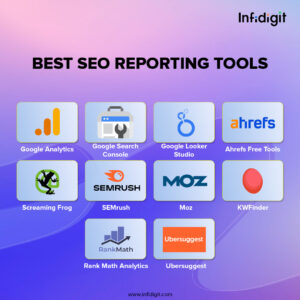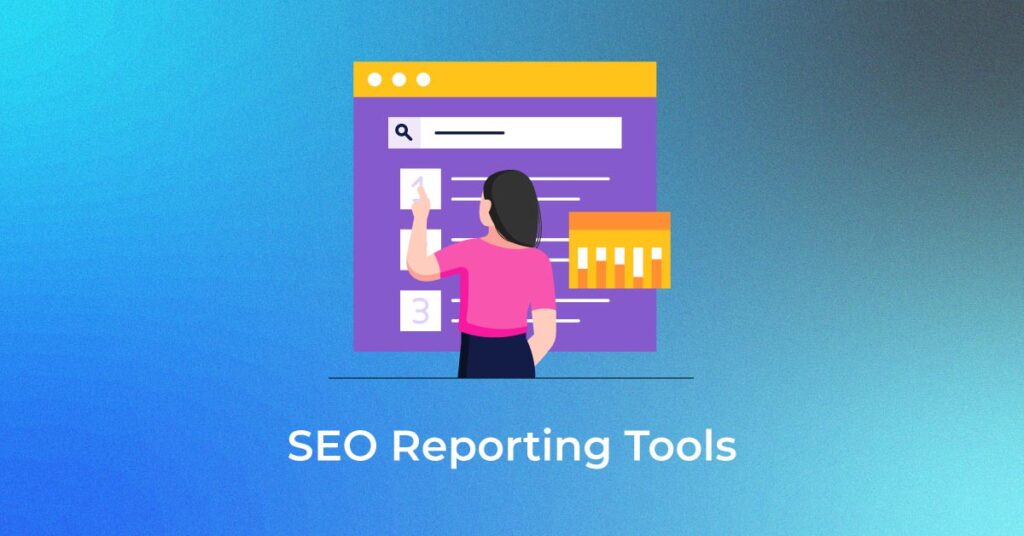As digital marketing continues to evolve, staying on top of your SEO performance is crucial to maintaining and boosting your website’s rankings. The right SEO reporting tools can provide valuable insights into your site’s health, helping you track progress and identify areas for improvement. By incorporating advanced SEO tools into your strategy, along with expert SEO services, you can ensure that your website is consistently optimized for success. In this guide, we’ll explore the best SEO reporting tools of 2025 to help you take your SEO game to the next level and drive meaningful results.
Free and Paid Tools to Elevate Your SEO Audit Reporting
Unleashing the Potentials of Free SEO Reporting Utilities
Free SEO reporting utilities are powerhouses in disguise, providing you with critical insights without any financial commitment. With these tools, you can visualize your website’s data, track keyword rankings, and monitor your backlinks with ease. Whether you’re a small business owner or a budding marketer, incorporating these tools into your SEO strategy can offer a wealth of information. They enable you to identify the low-hanging fruits and areas that require immediate attention to improve your site’s SEO structure and content strategy.
Premium Tools That Warrant the Investment
Investing in premium SEO reporting tools is often a strategic move that delivers a robust set of features for a more comprehensive analysis of your SEO efforts. Premium tools often include enhanced functionality such as detailed competitor analysis, deep keyword research capabilities, technical SEO audits, and more. For professionals requiring advanced reporting and in-depth insights, these paid tools warrant the investment. They also frequently come with superior customer support and regular updates to stay abreast of the changing landscapes of search engines.
Understanding the Importance of SEO Reporting
Key Benefits of Effective SEO Reporting
Effective SEO reporting is instrumental in steering your digital marketing efforts in the right direction. Key benefits include:
- Influencing Strategical Decisions: Armed with data from SEO reporting, you can pinpoint the strategies that yield the best results and allocate resources accordingly.
- Monitoring Progress: Track your SEO campaigns, witnessing improvements or identifying stagnant areas that need a boost – a great motivator and a roadmap to success.
- Competitive Analysis: Understanding how you stack up against the competition helps you to spot opportunities you might have overlooked and threats to address.
- Identifying SEO Challenges: A good SEO report uncovers the issues hindering your website’s performance, enabling you to rectify them swiftly.
- ROI Clarity: Being able to quantify the success of your SEO tactics in terms of return on investment can solidify the value of your marketing efforts to stakeholders.
How SEO Reporting Drives Business Growth
SEO reporting serves as a critical digital marketing tool, guiding your business growth by reflecting real-time performance and historical trends. These insights empower you to make data-driven adjustments to your SEO tactics, improving search engine visibility and driving organic traffic. By monitoring key metrics through SEO reporting, businesses can refine their content strategy, enhance user experience, and fuel sustainable growth.
Best SEO Reporting Tools of 2025

1. Google Analytics
Google Analytics is a must-have tool for SEO reporting, especially with its new version made to meet the changing needs of marketers. It helps you track important metrics like how users behave on your site, where they come from, how they engage, and their conversions. By understanding how visitors find and interact with your site, you can better adjust your content and improve your optimization strategies.
Here’s why Google Analytics is a top-notch choice:
- Seamless integration with other Google services and third-party tools.
- Multi-faceted insights into audience demographics and interests.
- Advanced tracking of user journeys across your website.
- Real-time data to monitor current site performance.
- Customizable goals and reporting for tailored analysis.
On the downside, beginners might find Google Analytics somewhat overwhelming due to its depth of features, and with the wealth of data available, pinpointing actionable insights can sometimes be a challenge. Yet, for those who master it, Google Analytics proves invaluable as a Google SEO Tool for businesses aiming to understand and enhance their online presence.
Best for: Seasoned marketers and businesses seeking deeply nuanced insights into their website’s performance and user behavior.
2. Google Search Console
Google Search Console is a cornerstone tool for anyone looking to refine their website’s SEO. It offers direct insights from Google’s perspective, giving you an unrivaled understanding of your site’s performance in search results. With it, you can report on the impressions, clicks, and click-through rates for various queries, track the indexing status of web pages, and monitor the health of your site as seen by the search engine giant.
Benefits of using Google Search Console:
- Specifically designed to enhance your site’s Google search performance.
- It’s free, making it accessible to businesses of all sizes.
- Can help identify and resolve security issues like hacking or malware.
- Facilitates the understanding of the impact of mobile usability on your rankings.
- Integration with Google Analytics for a more comprehensive data analysis.
Some cons are its learning curve for new users and the fact that data is limited to Google’s search engine without insights from other search engines. Despite these minor drawbacks, Google Search Console is best for webmasters, SEO professionals, and business owners who aim to optimize their site’s organic search performance.
3. Google Looker Studio
Google Looker Studio, previously known as Google Data Studio, is a formidable tool for crafting visually engaging and interactive SEO reports. The platform excels at unifying data from various sources, enabling detailed and customizable visualizations that align with your SEO goals.
Why Google Looker Studio stands out:
- Allows for a high level of customization to match your brand’s aesthetic and reporting needs.
- Integrates seamlessly with Google Analytics, Ads, Search Console, and other databases.
- Capable of pulling in data from non-Google sources, providing a holistic analysis platform.
- Facilitates collaborative work and sharing amongst teams for collective decision-making.
- Free to use which greatly benefits budget-conscious businesses and individuals.
Best for: Business intelligence analysts, marketers, and SEO professionals looking for flexible, advanced reporting capabilities without additional costs.
4. Ahrefs Free Tools
Ahrefs’ suite of free tools is an exceptional boon for SEO professionals and webmasters, offering invaluable insights without any cost. With a focus on accessibility, these tools provide the ability to report on a variety of key SEO metrics, crucial for a well-rounded strategy.
Here’s why Ahrefs’ Free Tools are an excellent resource:
- Their free keyword rank checker lets you visualize your site’s ranking position in various countries, offering global insight.
- The website traffic checker is beneficial for analyzing your competitors’ website traffic, giving you a competitive edge.
- Ahrefs’ broken link checker helps maintain your site’s health by identifying and reporting on broken links, which can negatively impact SEO.
- The website authority checker enables you to assess any website’s Domain Rating (DR), deciphering the strength of their backlink profile.
- Lastly, the free keyword difficulty checker facilitates the identification of new keyword opportunities, a must for content strategy.
Best for: SEO beginners, small business owners, and marketers who need a concise yet powerful snapshot of their website’s SEO performance.
5. Screaming Frog
Screaming Frog stands out as a desktop SEO auditing tool renowned for its in-depth crawling capabilities. It is the go-to solution for SEO professionals aiming to uncover and address technical issues that hinder a site’s SEO performance.
Why Screaming Frog is a prime choice:
- Efficiently finds broken links (404 errors) across your site, allowing you to fix or redirect them promptly.
- Analyzes page titles and metadata to ensure optimal length and relevance, which are vital for search rankings.
- Detects duplicate content that could dilute your SEO efforts and provides means to resolve it.
- Extracts data with XPath, CSS Path, and regex, offering a granular level of control over the data you collect.
- Allows the export of data and generation of insightful reports that can guide your SEO strategy.
Best for: SEO specialists and agencies that require detailed technical analysis and reporting for medium-to-large websites.
6. SEMrush
SEMrush is widely celebrated for its extensive suite of SEO tools, making it an indispensable asset for professionals who seek to elevate their SEO reporting to new heights. Not only does it facilitate keyword research and position tracking, but it also specializes in competitor analysis, creating a robust environment for strategic SEO planning.
Why SEMrush garners acclaim:
- Offers a competitor discovery report that unveils your rivals’ strategies.
- Tracks rankings across various devices and locations to give a comprehensive view of your SEO standing.
- Allows for an unlimited number of competitors to be tracked, providing a broad competitive landscape.
- Utilize its filter by SERP feature to delve deeper into search engine results page analysis.
- Easy integration with Google Search Console and the creation of disavow files enhance your site’s backlink profile management.
Best for: Digital marketing and SEO professionals, as well as large businesses, that require an all-in-one platform for extensive SEO reporting and analysis.
7. Moz
Moz is an acclaimed SEO software suite that streamlines the process of SEO monitoring, keyword research, site auditing, and more. It is designed to enhance the online visibility of your business and improve the overall performance of your campaigns through data-driven insights.
Key features of Moz:
- Keyword Research: Discover valuable keywords and track their rankings to optimize your content strategy.
- Site Audits: Identify and fix technical website issues that could be affecting your search rankings.
- Backlink Analysis: Explore your backlink profile to understand and harness its impact on your SEO.
- On-Page Grader: Evaluate the SEO strength of individual pages to improve on-page elements.
- Customizable Reports: Generate branded reports that align with your or your client’s preferences.
Why Moz stands out:
- Provides a comprehensive SEO toolset suitable for diverse users, from beginners to experts.
- The platform’s user-friendly interface makes navigating and understanding SEO data more approachable.
- Offers an exceptional educational resource through Moz Academy, which helps users expand their SEO knowledge.
Best for: Moz is ideally suited for digital marketing professionals, SEO agencies, and businesses focusing on local SEO and reputation management who are willing to invest in a sophisticated toolset to elevate their online presence.
8. KWFinder
KWFinder specializes in finding high-impact keywords with low competition, making it a strategic tool for niche websites and businesses aiming to optimize their content for search engines. It cuts through the clutter, directing you toward the opportunities that maximize your SEO potential.
Top reasons to choose KWFinder:
- It is particularly useful for uncovering long-tail keywords that could drive targeted traffic to your website.
- KWFinder simplifies the search for optimal keywords by filtering out those with high SEO difficulty.
- Provides precise search volumes and trend data to help you understand keyword popularity over time.
- Enables localized keyword research efforts, a perfect match for businesses targeting specific geographic areas.
- Offers insights into which keywords competitors rank for, helping define your SEO battlefield.
Best for: Content strategists, small to mid-sized businesses, and marketers looking for a focused, easy-to-use keyword research tool that won’t overwhelm you with unnecessary features.
9. Rank Math Analytics
Rank Math Analytics integrates seamlessly into WordPress, providing a powerful yet user-friendly platform for SEO reporting. By offering a suite of analytics tools directly in the dashboard, you can effortlessly monitor, report, and optimize your site’s SEO performance.
Core reasons to adopt Rank Math Analytics:
- Direct integration with Google services like Search Console and Analytics ensures you’re getting accurate data straight from the source.
- The keyword tracking feature empowers you to keep a close watch on your site’s keyword performance in search results.
- Through site analytics, Rank Math paints a comprehensive picture of your content’s performance and pinpoints areas for improvement.
- The performance overview presents you with crucial metrics like total search traffic and others to aid in making informed SEO decisions.
- Schema implementation becomes less of a hassle as Rank Math guides you through the process, enhancing your content’s potential in SERPs.
Best for: Content creators, bloggers, and digital marketers who use WordPress as their primary CMS and seek a comprehensive, integrated SEO analytics tool.
10. Ubersuggest
Ubersuggest, crafted by renowned marketing expert Neil Patel, is a tool that shines in its ability to generate keyword ideas and offer actionable SEO insights with simplicity at its core. It is particularly favored by those who wish to quickly understand the SEO terrain without delving into overly complex analytics.
Reasons Ubersuggest is recommended:
- User-friendly for beginners with clear and straightforward reports.
- Keyword research tool presents a wealth of ideas, including question-based queries for content creation.
- Provides a domain overview that helps you assess both your and your competitors’ SEO health.
- The tool has a backlink checker to track and analyze your backlink profile diligently.
- Offers SEO project management features, allowing tracking of website rankings over time.
Best for: Small business owners, startups, and individuals who are venturing into the SEO world and need an intuitive, straightforward tool.
How to Choose the Right SEO Reporting Tool for Your Needs
Choosing the right SEO reporting tool for your needs entails a balanced consideration of various functional, budgetary, and user-experience aspects. Here’s how you can ensure you pick a tool that aligns perfectly with your objectives:
- Establish Your Goals: Determine what you aim to achieve with your SEO efforts—is it improving rankings, increasing organic traffic, or something else? Different tools have strengths in different areas.
- Assess Your Skill Level: Pick a tool that matches your technical expertise. If you’re new to SEO, a tool with a gentle learning curve and strong educational resources might be preferable.
- Consider Integration Needs: Your tool should ideally integrate with other software you use, such as CRM systems, Google Analytics, and social media platforms, to streamline your workflows.
- Evaluate Features vs. Price: Some tools offer a wealth of features for a premium. Others are more cost-effective. Align the tool’s features with your budget, ensuring you’re not paying for more than you need.
- Test Usability: Take advantage of free trials to test the user interface and reporting capabilities. The tool should help you visualize and understand the data effortlessly.
- Check for Customization: You may want to create reports that emphasize different metrics for different clients or projects. Look for tools that offer this level of flexibility.
- Examine Support and Resources: Reliable customer support and extensive knowledge bases can tremendously ease the learning process and help you troubleshoot any issues that arise.
- Read Reviews and Case Studies: Learn from the experiences of others who have used the tools. Reviews and case studies can provide candid insights into the pros and cons of each option.
Once you’ve gathered this information, you’ll be well-equipped to make an informed decision, ensuring your selected SEO reporting tool meets your specific needs and enhances your overall strategy.
Tips for Effective SEO Reporting
Effective SEO reporting hinges on clarity, strategy, and actionable insights. Here are some tips to help you create reports that not only track performance but also empower decision-making:
- Focus on KPIs: Identify the key performance indicators that align with your SEO goals and ensure they are prominently featured in your reports.
- Use Visuals: Incorporate charts, graphs, and colors to make complex data more digestible and to quickly convey important trends and patterns.
- Customize for Your Audience: Tailor your reports to the audience’s needs. A C-suite executive may prefer high-level overviews, whereas a technical team might need detailed analytics.
- Provide Context: Numbers don’t always speak for themselves. Include benchmarks, historical data, and industry standards to give context to your findings.
- Recommend Actions: Go beyond presenting data by suggesting clear, data-driven recommendations for improving SEO performance.
- Be Consistent: Regular reporting intervals establish a reliable means to track progress over time and can highlight the effectiveness of SEO strategies.
- Streamline with Templates: Develop templates for different types of SEO reports to save time and maintain a consistent format for easy comparison.
- Stay Updated: SEO is ever-evolving, so ensure your reporting stays current with algorithm updates, new best practices, and the latest tools.
- Engage with the Data: Don’t just report—investigate. Look into anomalies or unexpected results to understand the underlying causes.
- Iterate and Improve: Use feedback to refine reporting processes and make them more relevant and useful for your needs and those of your clients or stakeholders.
By following these guidelines, you can ensure that your SEO reports not only showcase results but also provide a narrative that guides future optimization efforts.
Conclusion: Maximizing Your SEO Insights
In conclusion, incorporating the right SEO reporting tools into your strategy is not just about being informed—it’s about being transformative. Effective SEO reporting allows you to navigate the digital landscape with confidence, making informed decisions that lead to tangible outcomes. By utilizing the plethora of tools available, from the granular insights provided by premium platforms to the high-level overviews from free utilities, you can fine-tune your approach to optimize for better search engine visibility, engagement, and conversion.
The top SEO reporting tools of 2025 offer a treasure trove of data that, when leveraged properly, become the guiding force behind a successful SEO strategy that drives business growth. Remember, these tools aim to empower you with insights that maximize the impact of your SEO initiatives. Embrace the data, and let the insights gleaned lead you to smarter strategies and greater victories in the digital arena.
FAQs about SEO Reporting Tools
What features should I look for in an SEO reporting tool?
When selecting an SEO reporting tool, look for features including accuracy and reliability of data, a range of metrics such as rankings, backlinks, and site health, custom report generation, user-friendly interface, integration capabilities with other marketing tools, clear visual data presentation, and responsive customer support.
How can I improve my SEO reporting process?
To improve your SEO reporting process, automate data collection where possible, focus on key performance indicators relevant to your goals, utilize visualizations for clarity, keep reports concise and actionable, regularly review and adapt your reports to reflect changing SEO landscapes, and ensure clear communication of findings and recommendations to your audience.
Are there any free SEO reporting tools available?
Yes, there are free SEO reporting tools available such as Google Analytics for traffic and conversion insights, Google Search Console for search query data and site health, Ahrefs free tools for backlink and keyword analysis, and Moz’s free domain analysis tool, offering a budget-friendly start to SEO reporting.
What metrics are most important for SEO reporting?
The most important metrics for SEO reporting typically include organic traffic volume, keyword rankings, click-through rates (CTR), conversion rates, bounce rates, backlink quantity and quality, page loading times, and indexed pages. These metrics provide insights into website performance and user engagement.
Can SEO reporting tools help identify technical SEO issues?
Yes, SEO reporting tools can help identify technical SEO issues by conducting website audits that check for problems such as broken links, crawl errors, missing alt tags, poor mobile optimization, slow page load times, duplicate content, and improper use of canonical tags, guiding you to make necessary corrections for improved site health.
Popular Searches
How useful was this post?
0 / 5. 0













